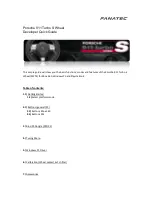
•
As the air bags deflate, you may see some smoke-like
particles. The particles are a normal by-product of the
process that generates the non-toxic gas used for air bag
inflation. These airborne particles may irritate the skin,
eyes, nose, or throat. If you have skin or eye irritation,
rinse the area with cool water. For nose or throat
irritation, move to fresh air. If the irritation continues,
see your doctor. If these particles settle on your clothing,
follow the garment manufacturer’s instructions for
cleaning.
Do not drive your vehicle after the air bags have deployed.
If you are involved in another collision, the air bags will
not be in place to protect you.
WARNING!
Deployed air bags and seat belt pretensioners cannot
protect you in another collision. Have the air bags, seat
belt pretensioners, and the seat belt retractor assem-
blies replaced by an authorized dealer immediately.
Also, have the Occupant Restraint Controller System
serviced as well.
NOTE:
•
Air bag covers may not be obvious in the interior trim,
but they will open during air bag deployment.
•
After any collision, the vehicle should be taken to an
authorized dealer immediately.
Enhanced Accident Response System
In the event of an impact, if the communication network
remains intact, and the power remains intact, depending
on the nature of the event, the ORC will determine whether
to have the Enhanced Accident Response System perform
the following functions:
•
Cut off fuel to the engine.
•
Flash hazard lights as long as the battery has power or
until the hazard light button is pressed. The hazard
lights can be deactivated by pressing the hazard light
button.
•
Turn on the interior lights, which remain on as long as
the battery has power.
•
Unlock the power door locks.
250 SAFETY
Summary of Contents for 1500 2018
Page 4: ......
Page 10: ......
Page 13: ...REAR VIEW Rear View 1 Rear Lights 2 Tailgate 2 GRAPHICAL TABLE OF CONTENTS 11 ...
Page 16: ......
Page 99: ...Uconnect 4C 4C NAV With Automatic Temperature Controls 3 GETTING TO KNOW YOUR VEHICLE 97 ...
Page 108: ...Operating Tips Chart 106 GETTING TO KNOW YOUR VEHICLE ...
Page 168: ......
Page 170: ...BASE INSTRUMENT CLUSTER Base Instrument Clusters 168 GETTING TO KNOW YOUR INSTRUMENT PANEL ...
Page 380: ...Understanding The Features Of Your Winch Winch Components 378 STARTING AND OPERATING ...
Page 676: ......
Page 683: ...INDEX 12 ...
















































